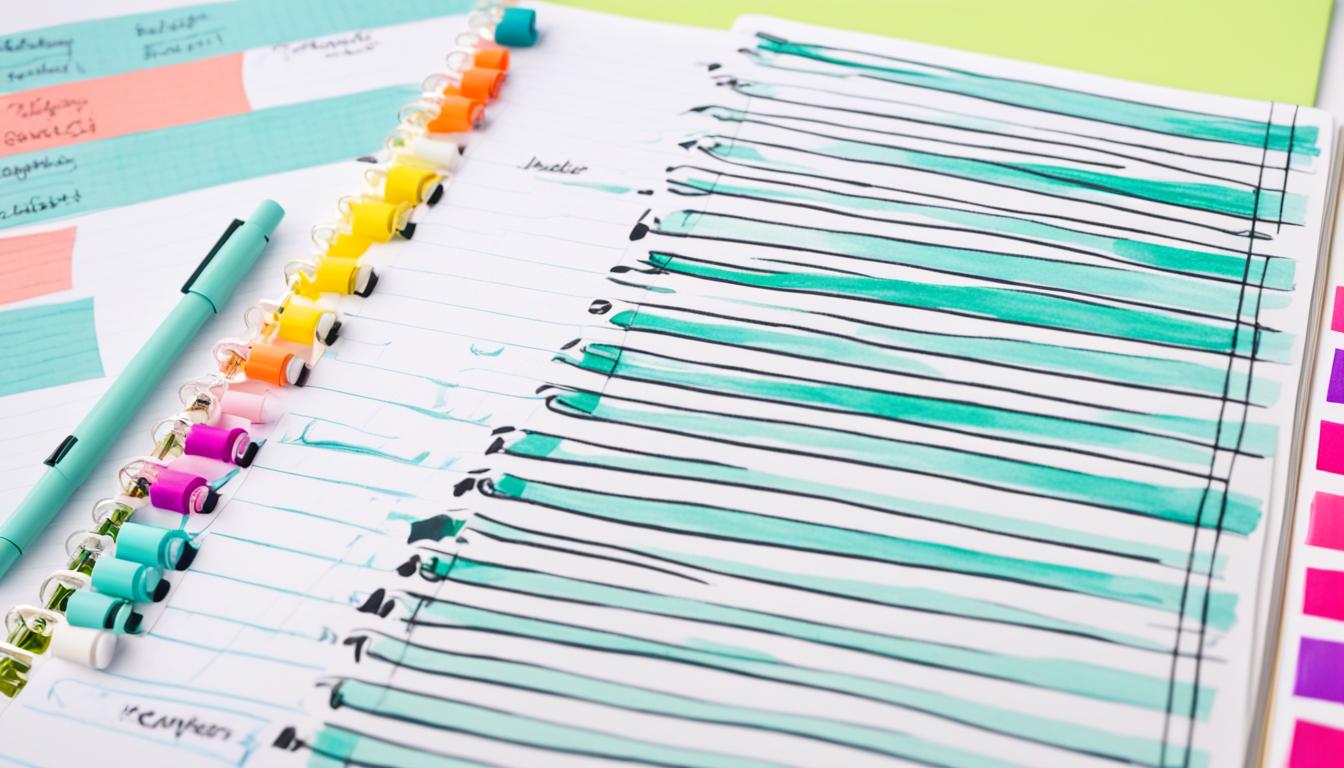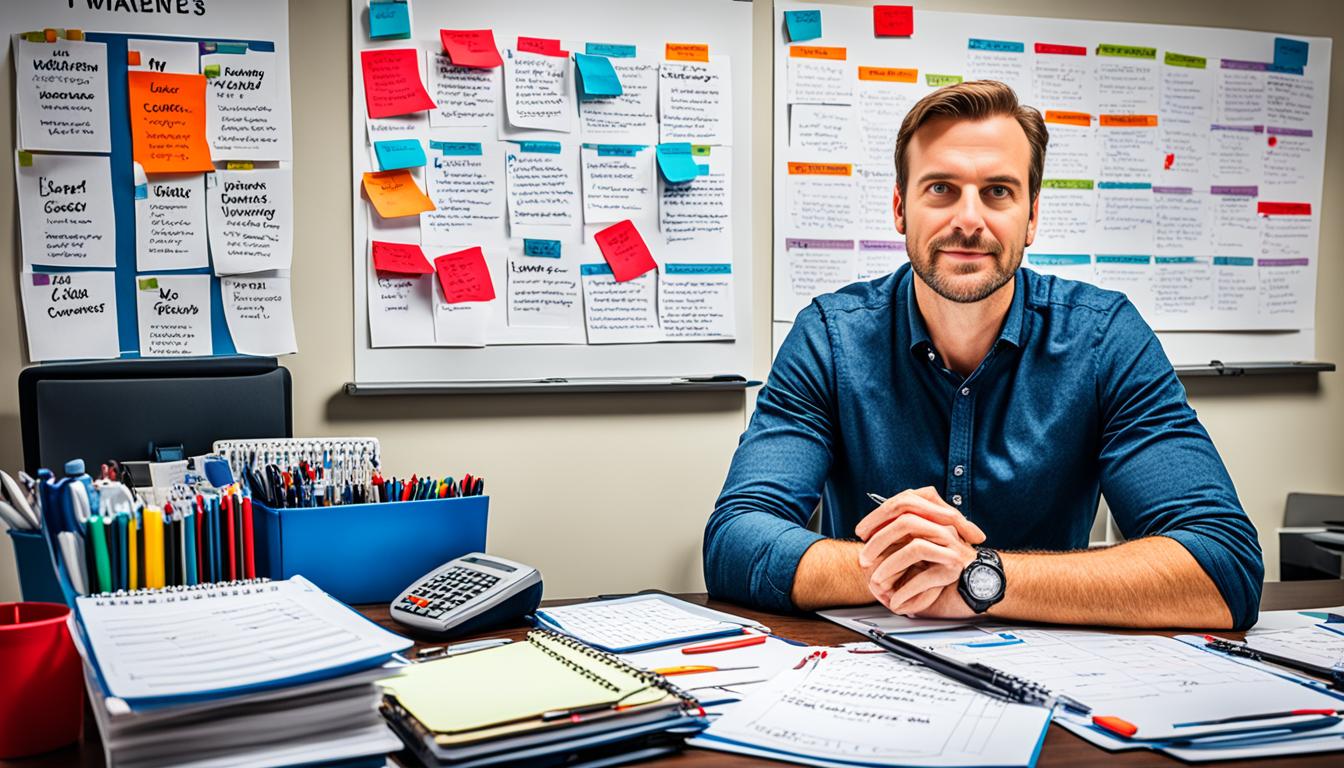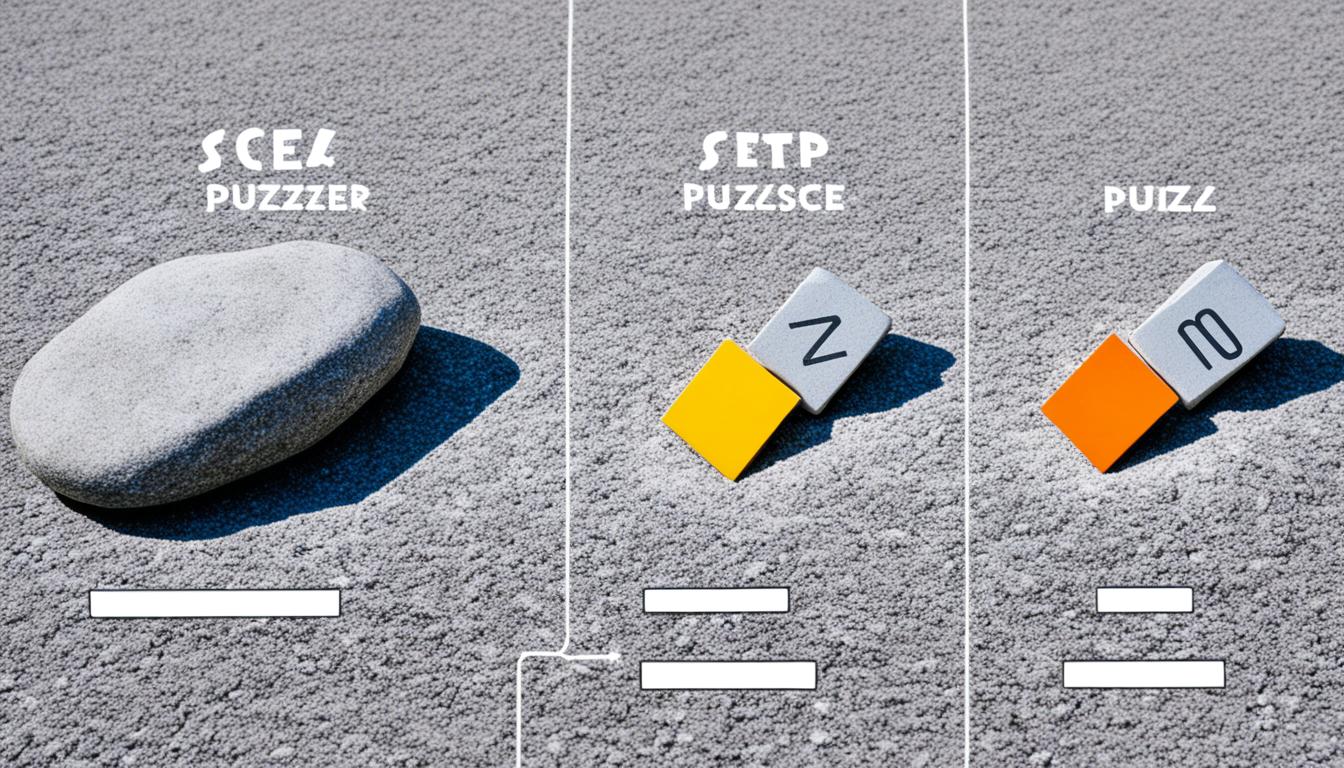About 88% of workers tend to procrastinate for over an hour daily. Poor handling of this can hurt productivity and mental health. Using proven productivity tips can beat procrastination. This leads to a work space without distractions and improves time management.
Digital distractions are everywhere today, making procrastination common. It often comes from feelings like anxiety and the fear of failing. For some, procrastination is a regular problem. About 20% to 25% of adults and 50% of students really struggle with it.
Working on productivity involves behavioral and thinking changes. Changing actions and replacing bad habits with good ones helps. Thinking positively instead of negatively does too. Splitting big tasks into smaller parts and listing them helps. It makes success feel closer and ensures no task is forgotten.
Knowing when you work best helps in doing important tasks first and keeping a regular schedule boosts productivity. Deadlines help by adding structure and reasons to stay motivated. Giving yourself a reward after finishing a task also helps keep you focused.
Dealing with digital distractions and managing time better helps control tasks and lowers procrastination. This not only makes you more productive but also betters your overall well-being. It’s very important for those who want to beat procrastination.
Understanding Procrastination and Its Causes
Procrastination isn’t just being lazy. It’s often about not dealing with bad feelings. People avoid tasks to feel better for a little while. This may make them feel good now, but it makes them put off tasks later too.
Emotional Factors
Emotions like fear and anxiety cause procrastination. For students, the pressure for grades can lead to procrastinating. They put things off to avoid feeling like they can’t do it. If they fail, they say they didn’t have enough time.
Knowing why emotions make us procrastinate helps us fight it.
Neuropsychological Factors
Struggles with executive function are key too. This includes planning and staying focused. People who struggle here tend to procrastinate more. They find it hard to start and finish tasks.
Dopamine and Habits
Dopamine plays a big role as well. When it’s low, we procrastinate to do fun things instead. Checking phones or social media feels good right away. Knowing how dopamine affects us can help us stop procrastinating.
Understanding why we procrastinate, from emotions to brain functions, helps us address it. Then, we can work towards being more productive.
Flip Negative Thoughts to Positive Self-Talk
Many people procrastinate, with 88% of workers putting off tasks for at least an hour every day. To combat this, changing negative thoughts into positive ones is key. It’s about turning negative thoughts into positive messages and beliefs.
Impact of Positive Self-Talk
Positive self-talk helps people stick to exercise, deal with anxiety, and feel more confident and strong. Positive messages can fight negative thoughts. This lessens depression, anxiety, and stress. A 2012 study shows self-kindness can lessen the impact of bad times, helping people procrastinate less.
Mindfulness practices improve how we talk to ourselves, they boost focus and task management. Dr. Pychyl says to focus on the next step to feel less overwhelmed and more motivated. This helps complete tasks better and faster.
Examples of Positive Self-Talk
To practice positive self-talk, keep a journal. Record negative thoughts and turn them into positive statements. For example, change “I’m not good enough” to “I am capable and getting better.” Forgiving oneself for past delays also helps reduce future procrastination.
Use affirmations like “I can change my habits” and “Every step I take is important for my success.” These positive statements help fight off negative thoughts. They build a healthier inner voice that can beat procrastination.
Set Clear Goals and Priorities
Beating procrastination begins with setting smart goals and choosing which tasks are most important. Using SMART goals—Specific, Measurable, Achievable, Relevant, Time-bound—makes a big difference.
SMART Goals
SMART goals help us see things more clearly and stay on track. Specific goals get rid of confusion. Measurable ones allow us to see our progress. Achievable ones keep us going.
Relevant goals fit with our main aims. Time-bound ones give us a deadline. Research shows that unclear goals lead to missed deadlines for 26% of workers every week. Clear goals, however, help us finish things.
Prioritizing Tasks
Choosing which tasks to do first is key to beating procrastination. The Eisenhower matrix helps us sort tasks by urgency and importance. This makes big jobs seem smaller and easier to handle.
Setting deadlines for all tasks, even if they’re not urgent, helps a lot. It makes us act faster. This way, we avoid delays. It also helps us beat fear of failure and wanting everything to be perfect.
Create a Structured Schedule
Creating a structured schedule is key for better productivity and fighting procrastination. By using time management methods like the Pomodoro Technique and time blocking, you set clear routines. These routines help with step-by-step progress. Having a structured schedule keeps distractions away. This lets you stay focused and work efficiently.
Using the Pomodoro Technique
The Pomodoro Technique breaks work into 25-minute focus intervals, followed by short breaks. It helps you stay concentrated and less tired. This way, you won’t put off tasks. By breaking tasks into small parts, you create a work routine. This boosts productivity and keeps you moving forward.
Time Blocking
Time blocking is a powerful time management tool. You dedicate specific times for different tasks. By planning tasks in time blocks, you build a structured schedule. This removes the uncertainty of what to do next. It helps manage tasks and keeps your day balanced. With time blocking, every task gets the attention it needs. This increases your productivity.
Minimize Distractions
Minimizing distractions helps beat procrastination. By cutting out distractions, you can focus better and do more work. This makes you more productive during your work time.
Digital Distinctions
A study shows people get sidetracked every 40 seconds while on computers. So, it’s key to turn off notifications. This stops distractions and helps you focus again. It often takes 25 minutes to refocus after a distraction.
Social media and fast food can distract us from our tasks. Limit these digital distractions to focus better. Consider blocking distracting sites or set times to check them.
Creating a Focused Workspace
A clean workspace makes you more efficient. A Harvard study shows this clearly. Keep your area tidy to stay focused.
Research shows a well-set workspace nearly doubles productivity. Use 30-minute work bursts to increase focus. Scheduling breaks makes them more effective, too.
Tell others to respect your focus times. This makes your workspace better for deep work. You’ll be more productive and procrastinate less.
Develop a Self-Reward System
Research shows that a reward system boosts productivity. It helps people finish their tasks by using brain rewards. These rewards fight off procrastination. Our brain’s pleasure centers help us feel motivated through this system.
In 2018, a study showed that small, frequent rewards make work more enjoyable. They also increase interest. This method works with our brain’s happiness centers. By setting small goals, we make big progress over time.
Making rewards that fit what you like makes them work better. If the reward matches the task, motivation goes up. For example, take small breaks or treats after working hard. This makes your goal seem closer and more exciting.
Having friends or family support you is key. They help you keep up with new habits. It takes a bit over two months to form a habit. But after five tries, you’re more likely to stick with it.
Create a flexible reward system for long-term success. Change rewards as habits form to keep motivation high. Instant rewards link behaviors to productivity. This balance between work and reward helps beat procrastination.
Break Down Large Tasks into Smaller Steps
Starting a big project can feel too much, especially when it’s hard to see each detail. Our minds can really keep track of about 3 to 5 things at once. So, breaking big tasks into smaller ones helps us a lot.
When you break tasks down, you make your path clearer and get to celebrate small wins. This is great for people who often put things off. In fact, most college students find this very helpful.
This approach helps you stay focused and less distracted. Large projects need a lot of focus and can easily overwhelm you. But, with smaller tasks, you can reach goals more quickly. This boosts your motivation and keeps you going.
Getting things done step by step not only helps finish tasks. It also makes you feel good about your accomplishments. Experts agree that this method works well in different areas. It helps you stop putting things off and succeed in what you want to do.
Focus on the Next Small Action
Focusing on the next small action can cut down feelings of being overwhelmed. This helps beat work paralysis. By doing simple tasks like opening a document or organizing your desk, you start moving towards bigger goals.
Reducing Overwhelm
Procrastination often comes from feeling too stressed by a big task. Research says starting with something small can lessen this stress. For example, working on a part of a project at a time helps beat paralysis. Taking little steps builds trust in yourself. This boosts self-worth and improves how much you get done.
Building Momentum
Starting with small, doable actions helps build work momentum. Winners focus on staying disciplined, managing their time, and sharing tasks. Websites like Fiverr, Upwork, and Craigslist can help with small tasks. This lets you concentrate on key duties.
Doing these actions often makes things smoother and leads to lasting success. It builds a path that not only fights off procrastination but also brings feelings of achievement and joy.
Create Daily To-Do Lists
Creating a daily to-do list is a great way to boost productivity. It helps people plan ahead, feel less stressed, and stay focused. Planning your day the night before can save about 15 minutes each morning.
About 20% of adults and almost 90% of students put things off. Breaking big tasks into smaller steps can help. This makes things easier to manage and increases motivation. Using a digital to-do list for reminders ensures nothing is missed.
It’s smart to set deadlines for every task. This helps you figure out what to do first. With a digital app, you can organize and prioritize easily. Making separate lists for work and personal tasks can improve organization.
Start your to-do items with a verb for better clarity. This makes tasks easier to start and finish. Working together on a list can also help. An organized to-do list helps everyone keep up with shared jobs. Keeping up with a list helps you stay focused and get more done with less procrastination.
Use Time Management Techniques
Using good time management techniques can really help you do more. The two-minute rule is a great tip. It says if you can do something in two minutes, do it right away. This stops small tasks from piling up and becoming too much.
The Two-Minute Rule
Following the two-minute rule helps you start tasks fast and feel good about it. It keeps small jobs from getting out of hand. This can make you up to 50% more productive, studies say.
Visualizing Task Completion
Thinking about finishing a task can also make you better at managing time. Imagine the good things that will happen when you’re done. This makes you want to work and do well.
Seeing your goals clearly can make you 30% more productive, research finds. This way, you manage your time well and put off things less.
Practice Self-Compassion
Self-compassion is key to beating procrastination, especially for creative folks. Studies show that 45% of creatives battle with self-compassion when they procrastinate. It’s important to stop being so hard on yourself and accept that no one’s perfect.
Procrastination hits about 20% of people in creative jobs hard. Knowing this can help us be nicer to ourselves. Most of the time, 65% feel doubt due to putting things off. Treating ourselves like a supportive friend can help beat those feelings.
UCLA’s research tells us to think of our future self as part of who we are now. Seeing shared struggles and keeping in tune with our feelings can change how we see tasks. It can make starting them easier.
Realizing procrastination is more about our feelings than time management is a game-changer. For 55% of artists, handling emotions is a big part of their work. Accepting that things don’t have to be perfect helps calm us down. This makes working much easier and more enjoyable.
Finding out the amygdala’s role shows us why some jobs scare us. Up to 40% of people in creative fields put off such scary tasks. Being kind to ourselves makes these tasks seem less scary. We can then tackle them with a positive attitude.
Showing ourselves kindness means we stress less about procrastination. This approach helps reduce bad feelings and makes for a more productive space. Developing self-compassion and forgiveness has a big impact. It helps us accept our flaws and meet our creative targets.
Conclusion
Beating procrastination is like going on a journey. It takes careful planning and lots of effort. Knowing why you procrastinate is the first step.
Make clear goals and organize your tasks well. Using tools like the Pomodoro Technique helps a lot. Also, try to keep away from too much screen time.
Starting your day with manageable tasks can give you a good start. Stay away from social media to keep focused.
Being kind to yourself is very important. It helps you handle the bad feelings that come with putting things off. Having someone to hold you accountable is good too. It helps you avoid delays.
If you stick with these methods, you can beat procrastination. This way, you can do better in all areas of your life.
FAQ
Why do I procrastinate even when I know it’s bad for me?
Procrastination is not about being lazy. It’s about not managing emotions well. When we avoid tasks, we feel a bit better at the moment.
How do emotional factors contribute to procrastination?
Stress and negative thoughts can lead to putting things off. Avoiding tasks makes us feel relieved briefly, yet it stops us from getting things done.
What neuropsychological aspects are linked to procrastination?
Issues with planning and focusing are linked to procrastination. These problems can make it hard to stay on task.
How does dopamine influence procrastination?
Low dopamine makes us choose fun activities, like social media, over work. This choice can make us lose focus on important tasks.
How can changing negative self-talk to positive self-talk help in combating procrastination?
Positive thinking boosts confidence and helps handle anxiety. Keeping a journal and reframing thoughts are good strategies.
What are some examples of positive self-talk?
Change “I can’t” to “I will do my best.” Swap “I always put things off” with “I can improve.” This helps us think more positively and get things done.
What is the SMART framework for goal setting?
SMART stands for Specific, Measurable, Achievable, Relevant, Time-bound. Goals set with SMART are clearer and easier to reach.
How can I prioritize tasks effectively?
Sort tasks by urgency and importance. Start with the most important ones. Breaking them down helps manage your work better.
What scheduling techniques can help enhance productivity?
The Pomodoro Technique and time blocking structure your day. They help you focus and cut down on procrastination.
How can I minimize digital distractions at work?
Turn off notifications and limit time on social sites. Apps that block distractions help keep your focus at work.
What are some ways to create a distraction-free work environment?
Keep your working area tidy. Tell others when you need to focus. A clean, quiet space helps you concentrate better.
How can a self-reward system help in reducing procrastination?
Rewarding yourself motivates you to keep focused. Treats or breaks after tasks make you want to continue working.
Why is it helpful to break down large tasks into smaller steps?
Smaller steps make big tasks less daunting. This strategy keeps you focused and makes starting easier.
How can focusing on the next small action help with productivity?
Starting with something simple builds momentum. It makes tasks seem less overwhelming and helps you progress.
What are the benefits of creating daily to-do lists?
To-do lists organize your day. They reduce stress and guide your work. Make them the night before for a smoother start.
What is the two-minute rule in time management?
If a task takes less than two minutes, do it now. This keeps tasks from piling up and encourages action.
How can visualizing task completion aid in overcoming procrastination?
Picture yourself finishing a task. This vision can push you to start and keep going until you’re done.
Why is self-compassion important in overcoming procrastination?
Being kind to yourself helps. It means understanding that procrastination happens. This approach can improve your outlook and work habits.

More Posts
11 Ways to Take Restorative Breaks
Feeling tired, overwhelmed, or mentally drained? These are signs that your brain needs a restorative break. The traditional eight-hour workday, rooted in industrial-era work patterns, often leads to mental fatigue, making restorative breaks...
5 Best Daily Planners with Goals (Free & Paid)
5 Best Daily Planners with Goals ( Free & Paid)
Why Can't I Focus Top 07 Reasons Why?
People frequently complain about their inability to focus at work, school, or even daily activities. They occasionally even struggle to keep up with the to-do list. How often have you checked your phone...
10 Calendly alternatives for better Call Scheduling
You’ll want to invest in the right scheduling tool. While Calendly is a common option, products vary in terms of features, price, use cases, integrations, ease of use, and other strengths. Let’s have...




